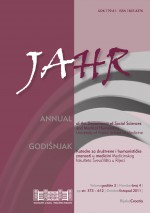Th e importance of Charles Darwin‘s theory for Fritz Jahr‘s conception of bioethics
Abstract
Fritz Jahr is a pioneer of bioethics. In this article I will present and outline Jahr’s bioethical
programme with a special emphasis on Charles Darwin’s role in Jahr’s ethics. According to
Jahr, useful and effi cient animal protection can only be practised well if we have enough
knowledge of nature. Jahr refers to Darwin who revolutionised our view of life and of the
relationship between the human being and the rest of living nature. In the fi rst introductory
section I will shortly present Jahr’s overall perspective and his bioethical imperative. I will also
give a very short sketch of today’s bioethics. In the second and third section I will outline Darwin’s revolutionary theory and its application to the human being. I will also present some of
the reactions of his contemporaries which refl ect Darwin’s achievement for our understanding
of living nature. In the fourth section I will go back to Fritz Jahr and will present and discuss
diff erent aspects of his approach in more detail. A fi nal quotation from Hans Jonas about the
dialectical character of Darwinism will trenchantly highlight Darwin’s importance for Fritz
Jahr’s ethics.
Downloads
Published
Issue
Section
License
Authors who publish with this journal agree to the following terms:
- Authors retain copyright and grant the journal right of first publication with the work simultaneously licensed under a Creative Commons Attribution License that allows others to share the work with an acknowledgement of the work's authorship and initial publication in this journal.
- Authors are able to enter into separate, additional contractual arrangements for the non-exclusive distribution of the journal's published version of the work (e.g., post it to an institutional repository or publish it in a book), with an acknowledgement of its initial publication in this journal.
- Authors are permitted and encouraged to post their work online (e.g., in institutional repositories or on their website) prior to and during the submission process, as it can lead to productive exchanges, as well as earlier and greater citation of published work (See The Effect of Open Access).



